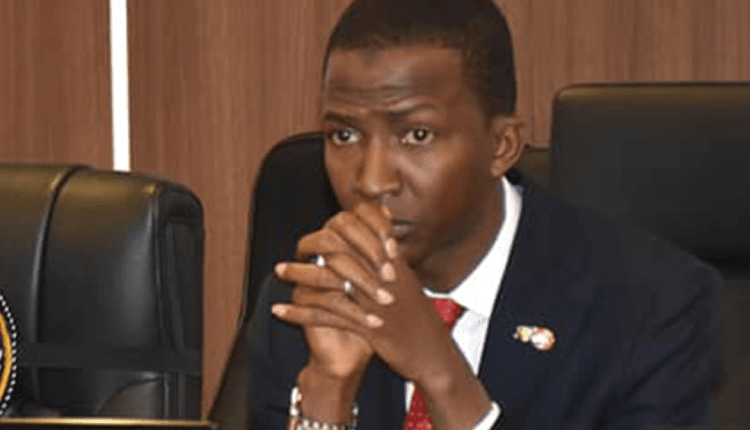Bawa’s release raises more questions
Late on Wednesday, October 25, 2023, the Department of State Security (DSS) announced the release of the immediate past Chairman of the Economic and Financial Crimes Commission (EFCC) after spending more than 100 days in their custody. Bawa’s ordeal began on June 14, 2023, following his suspension by President Bola Ahmed Tinubu. According to a […]

Abdulrasheed Bawa
Late on Wednesday, October 25, 2023, the Department of State Security (DSS) announced the release of the immediate past Chairman of the Economic and Financial Crimes Commission (EFCC) after spending more than 100 days in their custody.
Bawa’s ordeal began on June 14, 2023, following his suspension by President Bola Ahmed Tinubu. According to a statement from the office of the Secretary to the Government of the Federation, Bawa was suspended “due to weighty allegations of abuse of office levelled against him’’.
“President Bola Ahmed Tinubu, GCFR, has approved the indefinite suspension from office of Mr AbdulRasheed Bawa, CON, as the Chairman, Economic and Financial Crimes Commission (EFCC) to allow for proper investigation into his conduct while in office,” Willie Bassey, Director, Information in the Office of the Secretary to the Government of the Federation, said in the statement.
Hours after this announcement, the erstwhile EFCC chairman was taken into detention by officials of the DSS. The spokesman of the secret police, Peter Afunanya, while confirming the arrest, said the “invitation relates to some investigative activities concerning him’’.
100 days in gov’t: Emefiele, Bawa, others Tinubu has kicked out of office
Badagry council distributes 100 free GCE forms to students
Since then, nothing was heard about the fate of the former chairman until last week, following his release.
After a viral video showing Bawa’s family jubilating over his release, the DSS, through its spokesman, said: “DSS confirms the release of former EFCC chairman, Abdulrasheed Bawa a few hours ago (today 25th October, 2023).”
Despite the release, we feel that both the DSS and the federal government owe Nigerians more explanations regarding the issue.
One, since his arrest and subsequent detention, there has not been any word from the Presidency or the DSS as to the reason for the action, apart from the statement that he was being investigated for “weighty allegations’’. Similarly, contrary to the laws of the land, the public is not aware of any court order that authorised Bawa’s detention by the secret service.
Daily Trust believes that this is a big flaw and it is likely to set a bad precedent in the protection of the freedom of individuals as provided by our constitution.
We are aware that the DSS has the right to detain individuals it suspects are breaching the law or threatening the security of the country, but it must do so within the confines of the law.
The law does not give any entity or person a blank cheque to arrest and detain anyone for weeks without any evidence of a warrant to that effect by a court of law, or without reading them their charges in court.
Section 35(1) of our 1999 Constitution makes clear that: “Every person shall be entitled to his personal liberty and no person shall be deprived of such liberty save in some case and in accordance with a procedure permitted by law…”. The constitution then goes further to list six circumstances under which certain restrictions on the personal liberty of citizens are permissible. Even then, Section 35 (4) says categorically that where a person is lawfully arrested, they must be charged to court within “a reasonable time”, which it defines as not more than a period of two days. Of course, exceptions are allowed to this general rule, but those exceptions, too, must be in accordance to the law.
Personal liberty is a fundamental right guaranteed to every Nigerian citizen by the 1999 Constitution. That right applies as much to public officials as it does to ordinary citizens. It applies even to accused persons, no matter the alleged wrongdoing, since any restrictions on the personal liberty of accused persons must also be in accordance with the law.
The Department of State Security and indeed the federal government owe it a duty to Nigerians to explain why Bawa was arrested and detained for such a long period without any warrant of arrest. What were the reasons for his detention and whether he was found guilty or not guilty of the charges suspected of him. An explanation to these questions would go a long way in reassuring Nigerians that the government and its agents are committed to protecting their fundamental rights.
On the other hand, Nigerians will be happy to see Bawa prosecuted if the DSS investigation found him to have breached the law. A situation where people are allowed to breach the oath of their office should not be tolerated.
Bawa was the head of one of Nigeria’s foremost anti-corruption agencies, therefore, the fight against corruption is doomed if the heads leave office under a cloud of suspicion, or worse, if there is evidence of their wrongdoing but they are allowed to go free. If Bawa was found to have abused his office or engaged in any infraction, under no circumstances should he be allowed to go scot-free, not only to serve as a deterrent to others but also to strengthen Nigerians’ belief in equality before the law.
Nigeria’s democracy will thrive well if the government and its agents keep to the tenets of operating within the confines of the laws of the land. Otherwise, we will all be endangered species.
